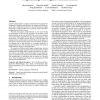Free Online Productivity Tools
i2Speak
i2Symbol
i2OCR
iTex2Img
iWeb2Print
iWeb2Shot
i2Type
iPdf2Split
iPdf2Merge
i2Bopomofo
i2Arabic
i2Style
i2Image
i2PDF
iLatex2Rtf
Sci2ools
140
click to vote
POPL
2010
ACM
2010
ACM
Programming with angelic nondeterminism
Angelic nondeterminism can play an important role in program development. It simplifies specifications, for example in deriving programs with a refinement calculus; it is the formal basis of regular expressions; and Floyd relied on it to concisely express backtracking algorithms such as N-queens. We show that angelic nondeterminism is also useful during the development of deterministic programs. The semantics of our angelic operator are the same as Floyd's but we use it as a substitute for yet-to-be-written deterministic code; the final program is fully deterministic. The angelic operator divines a value that makes the program meet its specification, if possible. Because the operator is executable, it allows the programmer to test incomplete programs: if a program has no safe execution, it is already incorrect; if a program does have a safe execution, the execution may reveal an implementation strategy to the programmer. We introduce refinement-based angelic programming, describe...
Angelic Nondeterminism | Angelic Operators | POPL 2010 | Programming Languages | Refinement-based Angelic Programming |
Related Content
| Added | 29 Sep 2010 |
| Updated | 29 Sep 2010 |
| Type | Conference |
| Year | 2010 |
| Where | POPL |
| Authors | Rastislav Bodík, Satish Chandra, Joel Galenson, Doug Kimelman, Nicholas Tung, Shaon Barman, Casey Rodarmor |
Comments (0)

